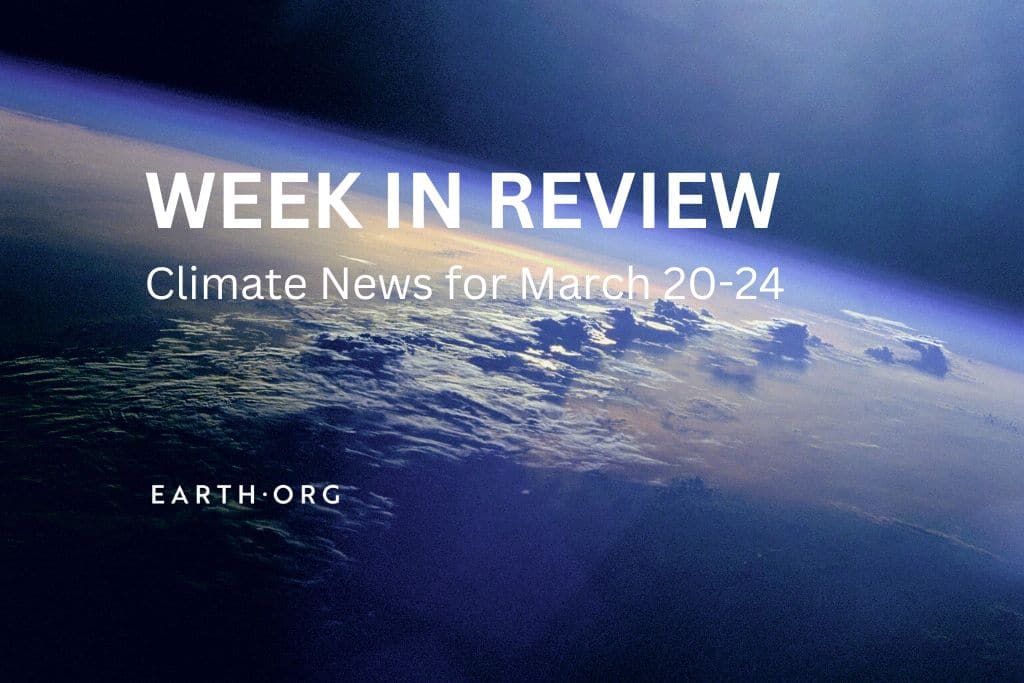This weekly round-up brings you key climate news from the past seven days, including the publication of the final instalment of the IPCC Climate Change Sixth Assessment Report, the EU’s new greenwashing regulations, and the adverse impacts of climate change in Somalia and Peru.
—
1. Scientists Deliver ‘Final Warning’ on Climate Change, Say 1.5C of Global Warming ‘Likely’ in Near Term
The planet is “more likely than not” to reach a 1.5C rise since pre-industrial levels in the near term, resulting in “increasingly irreversible losses,” the world’s leading scientists have warned in the fourth and final instalment of the Intergovernmental Panel on Climate Change Sixth Assessment Report (IPCC AR6) released Monday.
The long-awaited, 8,000-page report – called the Synthesis Report – summarises eight years of meticulous research conducted by hundreds of leading climate scientists and is considered the most comprehensive, best available scientific assessment of climate change ever compiled. According to the IPCC scientists, human activities have “unequivocally” caused global warming, leading to the highest concentrations of carbon dioxide in at least 2 million years and a 1.1C rise in global temperatures above pre-industrial levels.
Read more here.
2. World Faces 40% Shortfall in Freshwater Supply by 2030, Experts Warn Ahead of UN Water Conference
Demand for freshwater will outstrip supply by about 40% which could lead to a global water crisis if no imminent action is taken, a landmark report on the economics of water has found.
Published ahead of the UN Water Conference, which began on Wednesday in New York, the report outlines a seven-point call to collective action to achieve a sustainable and just water future and urges governments to take actions that are “bolder, more integrated, across sectors and more networked at national, regional and global levels.”
According to the World Health Organization (WHO), over 2 billion people – about one-fourth of the world population – live in water-stressed countries and have access only to contaminated drinking water sources, which pose huge health risks and can result in diseases such as cholera, dysentery, typhoid, polio, and diarrhoea.
Read more here.
3. EU Proposes New Criteria Against Greenwashing and Misleading Environmental Claims
The European Commission proposed new rules to crack down on businesses making false or misleading environmental claims, a practice known as greenwashing.
According to Wednesday’s proposal, the key objectives of the new regulations include increasing environmental protection and accelerating the green transition towards a circular economy, protecting consumers and companies by facilitating more eco-friendly choices, as well as improving the legal certainty of environmental claims and boosting the economic competitiveness among businesses that are trying to increase their environmental sustainability.
Under the new regulations, companies making “green claims” about their products and services will have to follow norms on how they “substantiate” and “communicate” them. Moreover, such claims “will need to be independently verified and proven with scientific evidence.”
Read more here.
4. Somalia Drought May Have Killed 43,000 People in 2022: Report
Around 43,000 people may have died in Somalia in 2022 from the ongoing drought that has been affecting the Horn of Africa in recent years, a new report by the United Nations and the Somali government has suggested.
Last year’s drought-related excess deaths are almost double those occurring in the first year of the 2017-2018 drought. Death rates are expected to keep rising in the first half of 2023, with “an additional 135 people […] projected to die each day due to the current crisis.”
The research, released Monday by the Federal Ministry of Health & Human Services, World Health Organization (WHO), and UNICEF, suggests that half of the deaths might have occurred among children under the age of 5. Areas around the Bay, Bakool, and Banadir regions in the south-centre of the country are those bearing the most brunt of the Somalia drought and are believed to have had the highest death rates.
Read more here.
5. Peru Announces $1bn in Climate Spending to Contain Impacts of El-Niño-Related Weather Events
Peru will spend some $1.06 billion on a climate plan to mitigate the impacts of global warming and the El-Niño weather pattern, economy minister Alex Contreras announced on Thursday. Climate spending will focus on regions most at risk of weather disasters, such as coastal areas vulnerable to flooding, with disbursements set to begin in the coming weeks.
The spending plan comes weeks after heavy downpours and flooding caused by cyclone Yaku in the north of the country killed at least eight, affected nearly 50,000 people, and caused infrastructure damages worth more than $320 million.
With more than 3,000 kilometres of coastline and fragile ecosystems, Peru is considered one of the world’s most vulnerable countries to climate change-triggered extreme weather events, with the capital Lima classified as one of the cities most threatened by rising sea levels.
Read more here.

















